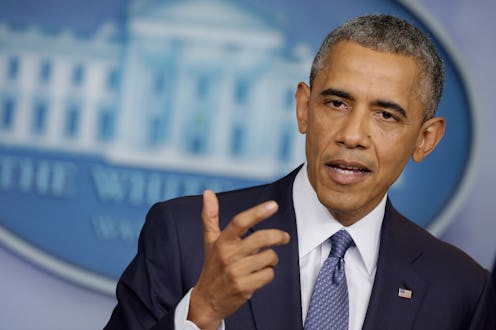News
President Obama's Last 2014 Press Conference
If anything was true of 2014, it's that the year was jam-packed with gripping, fascinating, and at times tragic news. And the tumult of the year isn't quite over with — it's ending out with congressional brouhaha over President Obama's plans for normalized relations with Cuba, as well as the apparently successful thwarting of Sony's The Interview, starring Seth Rogen and James Franco, by North Korean hackers (at least, according to the FBI). President Obama's end-of-year press conference touched on both of these topics, in advance of his upcoming Hawaiian Christmas with his family, for which he'll be departing from Washington Friday. In other words, Mele Kalikimaka, everyone.
It's a curious and bewildering combination of topics, to be sure, considering how unforeseeable it all was just one week ago — the administration did an excellent job keeping a lid on the Cuba negotiations, and even with the massive Sony hack and subsequent threats, few people seemed to anticipate that Sony would cave as completely as they've seemed to, pulling The Interview from theaters just a week ahead of its scheduled release. On both counts, Obama had some pretty firm and clear opinions — he's hoping Congress will come around on Cuba, though he acknowledged the likelihood of their hesitance, and he said Son'y decision to cede to the hackers' threats was "a mistake."
We cannot have a society in which some dictator someplace can start imposing censorship here in the United States. Because if somebody is able to intimidate folks out of releasing a satirical movie, imagine what they start doing when they see a documentary that they don't like. Or news reports that they don't like. Or even worse, imagine if producers and distributors and others start engaging in self-censorship, because they don't want to offend the sensibilities of somebody whose sensibilities probably need to be offended. ... I wish they'd spoken with me first. I would have told them 'do not get into a pattern where you're intimidated by these threats.'
Addressing the seismic shift in America's posture with Cuba, which has already occurred regardless of what transpires with Congress — Obama's phone call to Raul Castro this week was the first direct contact between an American and Cuban president since the Cuban revolution in 1959 — Obama's enthusiasm was clearly tempered by the considerable challenge that still lies ahead. Actually undoing the United States' 50+ year embargo on Cuba, after all, is a matter for the Congress, a Congress which will boast Republican majorities in both houses.
While acknowledging that Castro isn't likely to be dining at the White House anytime soon — Cuba, it's important to remember, has a human rights record every bit as terrible as many opponents of this newfound diplomacy claim — Obama maintained that through a more open relationship, the Cuban public would end up more receptive to change.
I don't anticipate overnight changes. But what I know deep in my bones is that if you've done the same thing for 50 years and nothing's changed, you should try something different if you want a different outcome, and this gives us an opportunity for a different outcome, because suddenly Cuba is open to the world in ways that it has not been before. The more the Cuban people see what's possible, the more interested they are going to be in change. But how societies change is country-specific. It's culture-specific.
Also, a side-note about this presser that's generated some discussion — Obama only called on eight reporters to ask questions of him, and every one of them were women. While it's impossible to say for certain if that's the first time such a thing has happened, at least not without a pretty thorough combing of the presidential press conference records, it was nonetheless a heartening note to close out 2014.
Image: Getty Images
